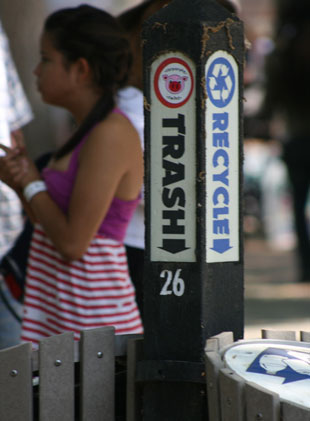Eco-Logic: Green Event Facts and Statistics
 It’s Time: Event Audiences Want Greener Events
It’s Time: Event Audiences Want Greener Events
74% of respondents to survey of UK festival-goers “agreed or strongly agreed that all festivals should implement environmentally friendly practices.” 91% indicated that “organisers should be responsible for minimising any damaging effects that a festival may have.”
Respondents also positively favored participation in the recycling and composting process; 81% “agreed or strongly agreed that if provided with separate bins they would separate their rubbish.”
“57% of festival-goers agree or strongly agree that re-usable crockery and cutlery should be used instead of disposables at festivals.” Some of the write-in comments “suggested that recyclable/bio-degradable disposables would be better.” [1]
Global Event Organizers Are Already Implementing Greening Initiatives
2/3 of respondents to a UK survey of festival organizers indicated that their events “had an environmental policy or implemented some kind of environmentally friendly practices.” [1]
The US Green/Healthy Living Market Sector Is Growing
According to a LOHAS (Lifestyle of Health and Sustainability Organization) study conducted by the National Marketing Institute (NMI/2003-2006), more than 139 million Americans are interested or active in the green living sector in 2006, more than doubling from 68 million in 2003. Consumer spending in the this market sector is $230 billion, split across five categories, including: Ecological Lifestyles ($81 billion), Sustainable Economy ($75 billion), Alternative Healthcare ($31 billion), Healthy Living ($28 billion), and Personal Development ($11 billion). [3]
Socially Responsible Investments Indicate Growing Public Interest
“Investors are seeing better returns with socially responsible investing,” says Joe Keefe, senior advisor for strategic social policy at The Calvert Group in Bethesda, Md. According to a recent Harris poll commissioned by Calvert, 84 percent of investors “are more likely to invest in a mutual fund if it engages in ethical business practices in its operations and reporting,” a statistic that reflects “a seismic shift in public sentiment,” Keefe says. [2]
Ecological Sustainability Is Profitable
“All the way across the board, there are stories and examples that this is a good idea,” says Christina Page, a member of the Commercial & Industrial Services team at the Snowmass, Colo.-based Rocky Mountain Institute (RMI). “It is possible to be both ecologically sustainable and economically profitable.” [2]
Sustainability Reporting Increases Accountability and Positive Public Image
Amy Domini, founder and CEO of New York City-based Domini Social Investments, says the SRI (Socially Responsible Investing) trend is more clearly seen in how many companies now publish sustainability reports or social responsibility reports. Nearly half of the S&P 500 now does so. [2]
Sources:
[1] Should UK Music Festival Organisers Implement Environmentally Friendly Practices into Event Management? – A Survey of Festival-Goers and Event Organisers – A Greener Festival, UK – 2006 – www.agreenerfestival.com
[2] Who’s Changing Whom? The LOHAS marketplace is fundamentally changing the structure of the American economy – and not the other way around – By Eric Peterson – www.lohas.com/journal/changing.html – 2007
[3] Understanding the LOHAS Market: A Focus on Corporate Social Responsibility – National Marketing Institute (NMI/2003-2006)
